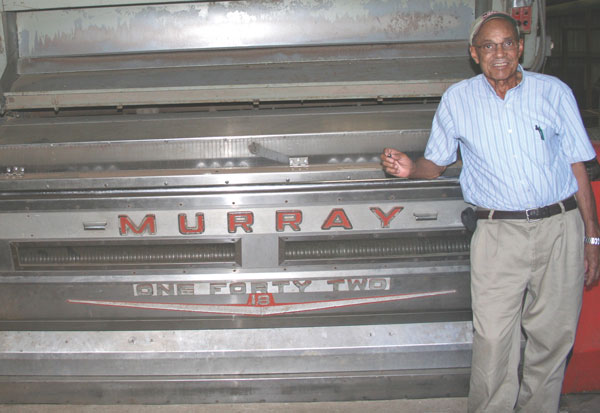November 8, 2013

In his 50 years of growing and ginning cotton, Jackson, N.C., ginner Thomas Bell has seen a lot of changes and has traveled a sometimes slippery road, proving to multiple generations that success in business or life is not determined by the color of one’s skin.
Bell is the third generation owner of Bell’s Cotton Gin in an area of North Carolina known as Occoneechee Neck.
He’s proud of his African American heritage and equally proud to be a distant descendant of General Matt Ransom, a North Carolina born lawyer, businessman, Civil War hero, and member of the North Carolina Legislature before and after the Civil War.
The cotton gin is a living testament to the hard work and tenacity that three generations of Bells steadfastly applied to running a minority owned business for nearly 100 years in rural North Carolina.
In 1917, Bell’s grandfather Sumner Fairfield Bell was given the deed to what was then called Mudcastle Gin. Mudcastle was the local name for what is now commonly referred to as Occoneechee Neck, located a few miles from Jackson, N.C., county seat of Northampton County, which borders Greenville County, Va.
Check current cotton futures prices
Exactly how he came to have the deed to the cotton gin isn’t exactly clear, but Bell says his grandfather most likely worked most of his life in the gin and Pat Ransom, General Ransom’s son, most likely financed the purchase of the gin and the deed was given to Sumner Fairfield Bell (Thomas Bell’s grandfather) once he paid off the loan to the Ransom family.
What role Matt Ransom had in the transition of ownership of the gin from the Ransom family to the Bell family may be lost forever. Suffice to say, Ransom who died in 1904, would have known Sumner Bell and would have had to approve of the transaction for it to happen.
Treated people fairly
Despite his service as a general in the Confederate Army and his election as a North Carolina representative to the Confederate Congress in Montgomery, Ala., Ransom was by all accounts a man who treated people fairly, regardless of the color of their skin.
More from Southeast Farm Press
Southeast winter weather to vary widely
Growers should like two new high oleic peanut varieties
U.S. farm export interests pushing for changes in China's biotech policies
High winds knock down Kentucky corn: Here are some harvest tips
“From stories passed down from my grandparents, it didn’t matter whether you were black or white, if you did your job and you lived in harmony in the community you were treated fairly.
“But, if you caused problems, it also didn’t matter whether you were black or white, you were likely to find a horse and buggy loaded with all your belongings in front of your house, and you, along with your problems, were removed from the property,” Bell says.
In 1935, in the recovery years of the Great Depression, Bell’s grandfather died. His father, who was attending college in New York at the time, was called home to run the cotton gin. From 1935 until 1963, Bell’s father ran the gin, though the last few years were a struggle because of medical problems that limited his ability to work.
In 1958, Thomas Bell was drafted into the U.S. Army. He was attending North Carolina A&T University at the time, but says his time in the military helped him build the dedication and confidence he needed to come back to North Carolina to run the family cotton gin.
The gin is still small by industry standards today, but when he took over in 1963, Bell says it was really small and the equipment was outdated. “That first year we ginned 800 bales of cotton and we felt like we had a big year. Now, we routinely run about 800 bales a week through the gin,” Bell says.
“When I came back home to run the gin we were only able to process about three bales of cotton an hour, and I knew that wasn’t going to be enough in the coming years,” Bell adds.
Through all the changes in the gin over his 50 years, one thing remained basically the same — his customers. Most of his current customers grew up in the cotton business and grew up coming to the gin in the fall with their fathers and grandfathers.
Where there’s a will
After the ginning season in 1963, a gin owner in nearby Whitakers, N.C. decided to modernize his operation and offered to sell his old equipment to Bell’s father. The catch 22 was that the manufacturer who installed the original couldn’t get to Bell’s gin for about a year.
Undaunted, in December of 1963 Bell and a small crew of local workers dismantled the old gin and began making plans to replace it with the old equipment from the Whitakers.
“I remember exactly what the fellow selling me the gin equipment told me: “You can buy it, but boy, you’ll never get it to run,” Bell says.
On Sept. 15, 1964 Bell and two local workers, Ernest Simson and Bill Lockhart, began the process of putting the used equipment in the gin in Occoneechee Neck. On Oct. 18, 1964, they ginned the first bale of cotton in the new facility.
In 1984, he changed the equipment out again — doing most of the work himself. Then again, in 1994, he bought used equipment, circa 1989, and redid the entire gin again for the third and last time.
While so many businesses struggle to find competent labor, Bell says his work force is home grown and knows exactly what to do when ginning season comes around.
“Most of the people who work here came to the gin as kids with their father. Their father came with their granddaddy and working at the gin is more of a family tradition than a job,” he says.
The gin only runs one shift and it’s run one way, the right way, Bell adds. “The one thing I don’t like about the cotton ginning business now is that during the season we have to work on Sunday. As long as my grandmother lived, the gin closed at 5 p.m. on Saturday and didn’t start back up until Monday morning,” he says.
During a long period of time, the facility was called Alice Bell Gin, because his grandmother (Alice) owned it after Sumner Bell died. When Bell took over the mill a few years after his grandmother died, he renamed it Bell’s Gin.
The biggest change in the cotton ginning business during his 50 years was the switch from hand-picked cotton to machine-picked cotton. Hand picked cotton was so clean. It had little if any moisture in it and it was just a dream to gin, he says.
Early machine-picked cotton hard to gin
Early machine-picked cotton ‘awful’When the first machine-picked cotton began to show up at his gin, he says it was awful. Over the years the efficiency of machine pickers has improved greatly and more current innovations like cotton modules and now the round bales from on-board module builders have greatly improved the quality of machine picked-cotton, he adds.
The North Carolina ginner says up to about 20 years ago, 100 percent of the cotton he ginned went directly to North Carolina or Virginia cotton mills. Now, virtually all of it goes to foreign markets, most to China.
“Where our cotton ends up has been a big change during my time in the ginning business,” he says.
During his 50 years of running the gin, Bell has seen his share of the bad side of running a minority owned business in a majority controlled market. Twice, he says, he had opportunities to significantly increase his gin business and modernize it, only to be turned down because of his race.
In 1968, he had a chance to modernize his gin, but needed a $121,000 FHA (now FSA) loan, which he didn’t get. Again in 1974, he needed $80,000 to buy a nearby gin and 40 acres of land. Again, despite being a successful multi-generation cotton gin owner, with plenty of business experience and financial security to justify the loan, it didn’t happen.
Rather than dwelling on shortcomings of the past, Bell is steadfastly determined to live in the now and plan for the future. He says his brother and his brother’s son will likely take over management of the gin when he can longer do so.
“The gin for me has been a lifetime investment. I’ve had to build it piece by piece, using profits from to year to improve it the next year. I couldn’t bear to turn it over to someone outside the family or to see it mismanaged,” he says
About the Author(s)
You May Also Like






